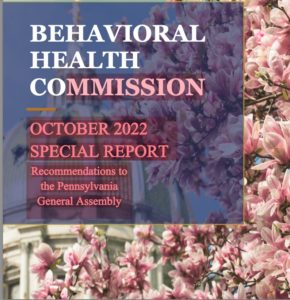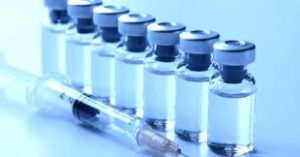PA Health Policy Update for Friday, October 7
The following is an update of selected state health policy developments in Pennsylvania for the week of October 3-7, 2022. (Some of the language used below is taken directly from state documents.)
 Behavioral Health Commission for Adult Behavioral Health
Behavioral Health Commission for Adult Behavioral Health
The Wolf administration has released the recommendations of its Behavioral Health Commission for Adult Behavioral Health, which was created to advise the General Assembly on how to spend $100 million in one-time federal American Rescue Plan Act funding, including to support adult behavioral health needs addressed in the state’s 2022-2023 fiscal code. The commission recommended that the $100 million be used in the following manner:
- $37 million to stabilize, strengthen, and expand the workforce
- $23.5 million to improve the criminal justice and public safety systems
- $39 million to expand capacity for services and supports
- $500,000 for a future study of the impact of this spending
The commission’s recommendations are only advisory; the General Assembly will consider its recommendations in the coming weeks and decide if and how to appropriate the $100 million.
Find a Wolf administration news release about the report here and the report itself here.
Department of Human Services
The Department of Human Services has announced its intent to allocate funds for FY 2023 supplemental payments to promote the continuation of quality medical services to individuals enrolled in the Medical Assistance program and to provide financial relief to hospitals during the COVID-19 pandemic. It does not intend to otherwise change the qualifying criteria or payment methodology for these payments. Learn more from this Pennsylvania Bulletin notice.
 Department of Health
Department of Health
- The Department of Health (DOH) has updated its interim infection prevention and control recommendations for health care settings to reflect recent changes in federal CDC recommendations.
- DOH has shared information on severe manifestations of monkeypox among patients who are immunocompromised due to HIV or other conditions. This is the same alert issued last week by the CDC.
- DOH has added to its naloxone standing orders that enable residents and first responders to obtain naloxone products to help combat the rise of overdoses in Pennsylvania a non-prefilled syringe with two single-dose vials of liquid naloxone that is injectable. Residents can present a copy of the state’s standing order, which can be found here, at their local pharmacy to obtain the naloxone. The medication also is available for free for personal use through a statewide mail-based naloxone program.
- DOH has issued an advisory about lead exposure in adults.
COVID-19: By the Numbers
- According to the CDC, the number of new COVID-19 cases in Pennsylvania over the past week was down 20 percent from the previous week and the number of deaths fell 10 percent.
- According to the Department of Health, the number of people hospitalized with COVID-19 and in hospital ICUs and on ventilators because of the virus remains relatively steady while the CDC reports a seven percent increase in the seven-day rolling average of new daily COVID-19 hospital admissions.
- For the first time in several months, all, or almost all, of Pennsylvania’s 67 counties are not experiencing a high rate of community transmission. Currently, 60 counties are still experiencing a high rate of community transmission while six counties – Forest, Centre, Lycoming, Union, Snyder, and Delaware – are experiencing “only” a substantial rate of community transmission and Philadelphia’s rate is now classified as moderate.
Monkeypox
- The CDC has posted an updated map showing the distribution of 26,385 confirmed cases of monkeypox in the U.S. as of October 6, up only slightly from 25,613 cases on September 29. 789 of those cases were in Pennsylvania, up from 713 a week ago.
- As of October 3, 495 of those Pennsylvania monkeypox cases were in Philadelphia, up from 475 on September 25. Learn more about monkeypox in Philadelphia from the city Department of Public Health’s monkeypox web page.
 Pennsylvania Health Care Cost Containment Council (PHC4)
Pennsylvania Health Care Cost Containment Council (PHC4)
PHC4 has issued the research brief “Hospitalizations for Opioid Overdose, 2016 – 2021” that looks at trends among state residents, ages 15 and older, who have been admitted to Pennsylvania acute-care hospitals for opioid overdoses. Find a news release about the report here and the report itself here.
Centers for Medicare & Medicaid Services
CMS’s Center for Medicare and Medicaid Innovation has released materials presenting its evaluation of year two of the Pennsylvania Rural Health Model, which seeks to improve access to hospital services and improve population health in underserved rural communities. New evaluation materials include a summary of the evaluation of the program’s second year; the full report; the report’s executive summary; and an appendix to the report. Learn more about the Pennsylvania Rural Health Model, including a list of its participating hospitals, from the program’s web page.
Stakeholder Events
DHS – Long-Term Care Workforce Motivation – October 13
DHS’s Long-Term Care Learning Network, part of its quality strategy for nursing facilities, is offering in collaboration with the Community HealthChoices managed care organizations and the Jewish Healthcare Foundation a webinar on how to express appreciation for long-term-care workers. The webinar will be held on Thursday, October 13 at 2:00. Learn more, including how to participate, from this notice.
DHS – Office of Mental Health and Substance Abuse Services and Office of Developmental Programs – Suicide Prevention – October 21
The Department of Human Services’ Office of Mental Health and Substance Abuse Services (OMHSAS) and the Office of Developmental Programs will host a quarterly “Statewide Positive Approaches & Practices” meeting that will share the most recent research and resources to help people with mental health and behavioral challenges, intellectual disabilities, autism, and other developmental disabilities live everyday lives. The specific subject of the meeting, to be held on Friday, October 21 at 9:00, will be suicide prevention and intervention. Find the meeting agenda and information about how to register to participate from this DHS notice.
Department of Health – Pennsylvania Achieving Better Care by Monitoring All Prescriptions Board – October 25
The Department of Health’s Pennsylvania Achieving Better Care by Monitoring All Prescriptions Board will hold its next meeting on Tuesday, October 25 at 9:30. The meeting location will depend on COVID-19 mitigation efforts at that time. If the meeting can be held in person it will be in Room 129 in the Pennsylvania Health and Welfare Building at 625 Forster Street in Harrisburg. If the meeting is held virtually it will be held at bit.ly/ABC_MAP. To dial in, call 267-332-8737, conference ID 440 338 696#. Learn more from this Pennsylvania Bulletin notice.
DHS – Medical Assistance Advisory Committee – October 27
DHS’s Medical Assistance Advisory Committee will meet virtually on Thursday, October 27 at 10:00. Go here to register to participate.
Department of Health – Special Pharmaceutical Benefits Program – Advisory Council – October 27
The Department of Health’s Special Pharmaceutical Benefits Program Advisory Council will meet in Harrisburg on Thursday, October 27 at 10:00. Interested individuals may attend in person or participate virtually. For information on the location of the meeting and how to join the meeting virtually, see this Department of Health notice.
DHS – Medical Assistance Advisory Committee – Managed Long-Term Services and Support Subcommittee – November 2
The Managed Long-Term Services and Support Subcommittee of DHS’s Medical Assistance Advisory Committee will meet publicly on Wednesday, November 2 at 10:00 in Harrisburg. Interested parties may attend in person or via webinar; those participating through the webinar must register in advance. For information about the location of the meeting, how to join it virtually, how to register, and how to offer comments or submit questions, see this DHS notice.


 Department of Drug and Alcohol Programs
Department of Drug and Alcohol Programs
 General Assembly
General Assembly COVID-19: By the Numbers
COVID-19: By the Numbers Department of Human Services
Department of Human Services Around the State
Around the State According to a Pennsylvania Department of Health news release,
According to a Pennsylvania Department of Health news release,